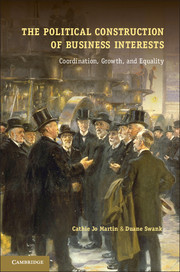The Political Construction of Business Interests Coordination, Growth, and Equality Cambridge Studies in Comparative Politics Series
Langue : Anglais
Auteurs : Martin Cathie Jo, Swank Duane

The Political Construction of Business Interests recounts employers' struggles to define their collective social identities at turning points in capitalist development.
Many societies use labor market coordination to maximize economic growth and equality, yet employers' willing cooperation with government and labor is something of a mystery. The Political Construction of Business Interests recounts employers' struggles to define their collective social identities at turning points in capitalist development. Employers are most likely to support social investments in countries with strong peak business associations, that help members form collective preferences and realize policy goals in labor market negotiations. Politicians, with incentives shaped by governmental structures, took the initiative in association-building and those that created the strongest associations were motivated to evade labor radicalism and to preempt parliamentary democratization. Sweeping in its historical and cross-national reach, the book builds on original archival data, interviews and cross-national quantitative analyses. The research has important implications for the construction of business as a social class and powerful ramifications for equality, welfare state restructuring and social solidarity.
Introduction; 1. Collective political engagement and the welfare state; 2. The political origins of coordinated capitalism; 3. The political origins of Danish employers' associations; 4. British experiments in national employers' organization; 5. Sectional parties, divided business in the United States; 6. The origins of sector coordination in Germany; 7. Twenty-first century breakdown: challenges to coordination in the post-industrial age; 8. Institutional sources of firms' preferences for the welfare state; 9. Employers, coordination, and active labor market policy in post-industrial Denmark; 10. Employers, coordination, and active labor market policy in post-industrial Britain; 11. The failure of coordination and rise of dualism in Germany; 12. The political foundations of redistribution and equality; Conclusion: 13. Social solidarity after the crisis of finance capitalism.
Cathie Jo Martin is Professor of Political Science at Boston University and former chair of the Council for European Studies. She is the author of Stuck in Neutral: Business and the Politics of Human Capital Investment Policy (2000) and Shifting the Burden: The Struggle over Growth and Corporate Taxation (1991) and has held fellowships at the Radcliffe Institute and the Russell Sage Foundation.
Duane Swank is Professor of Political Science at Marquette University and Vice President/President-Elect of the American Political Science Association Organized Section in Comparative Politics. He is the author of Global Capital, Political Institutions, and Policy Change in Developed Welfare States (Cambridge 2002) and has held fellowships with the German Marshall Fund and at the Australian National University.
Duane Swank is Professor of Political Science at Marquette University and Vice President/President-Elect of the American Political Science Association Organized Section in Comparative Politics. He is the author of Global Capital, Political Institutions, and Policy Change in Developed Welfare States (Cambridge 2002) and has held fellowships with the German Marshall Fund and at the Australian National University.
Date de parution : 03-2012
Ouvrage de 328 p.
15.1x23.5 cm
Date de parution : 03-2012
Ouvrage de 328 p.
16x24.1 cm
Thème de The Political Construction of Business Interests :
© 2024 LAVOISIER S.A.S.



